"Cherishing Little Steps - A Haven for Baby and Family Journeys"
The Best Developmental Toys for Babies: A Guide to Educational Play
When it comes to the development of your baby, the right toys can make a world of difference. But with so many options available, how do you know which ones are truly the best for educational play?
From stimulating sensory development to enhancing cognitive skills, each type of toy plays a critical role in your baby's growth and learning.
Stay tuned to discover the key categories of developmental toys that every parent should consider for their little one's educational journey.
Key Takeaways
- Stimulate brain development and enhance early learning skills through educational play.
- Foster critical thinking and problem-solving abilities with developmentally appropriate toys.
- Improve fine motor skills and coordination for overall physical and cognitive growth.
- Support language and communication development with interactive and engaging toys.
Benefits of Educational Toys
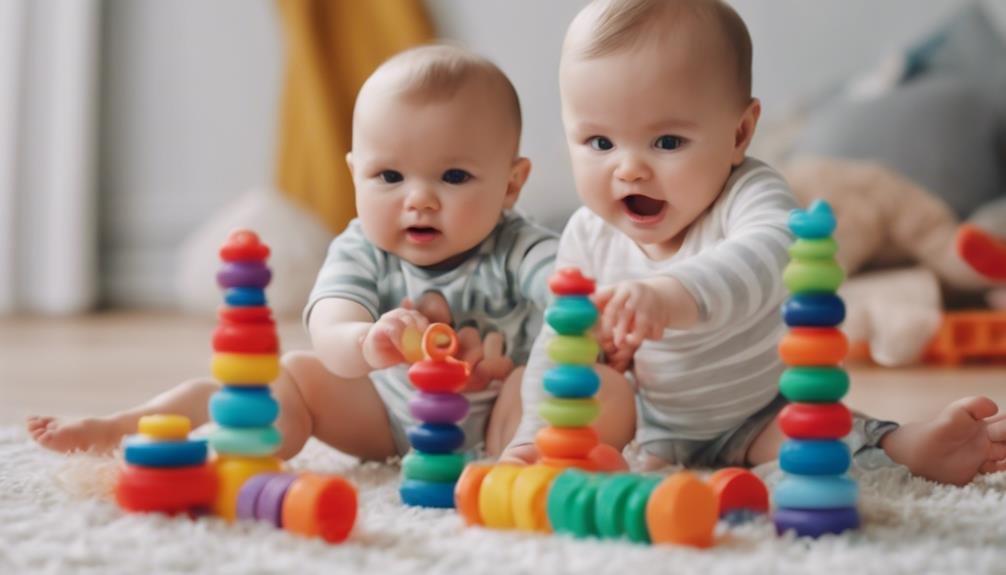
When choosing toys for your baby, considering the benefits of educational toys can have a significant impact on their development. Educational toys play an essential role in stimulating brain development and enhancing early learning skills. These toys offer more than just playtime benefits; they're designed to provide opportunities for exploration, problem-solving, and creativity, all of which are important for your baby's cognitive growth.
Research has shown that educational toys can help improve various skills, such as fine motor skills, hand-eye coordination, and language development. By engaging with toys that encourage active participation and interaction, your baby can enhance their problem-solving abilities and foster critical thinking from a young age.
Furthermore, these toys often incorporate elements that promote sensory exploration, which can further contribute to your baby's overall development. Through play, babies can learn to identify different textures, shapes, and colors, laying a solid foundation for future learning experiences. Investing in educational toys not only provides entertainment but also nurtures your baby's holistic growth and skill enhancement.
Sensory Development Toys
Exploring sensory development toys can provide your baby with valuable experiences that engage their senses and promote cognitive growth in a playful and interactive manner. Tactile exploration toys, such as textured balls or fabric blocks, encourage your little one to touch and feel different surfaces, aiding in the development of fine motor skills and sensory processing.
Visual stimulation toys like colorful mobiles or contrasting black-and-white cards can captivate your baby's attention, supporting their visual development and ability to focus.
Auditory essential is also vital for your baby's sensory integration. Toys that produce gentle sounds or music can help your baby become more attuned to different auditory stimuli, fostering their listening skills and sound discrimination abilities.
Sensory integration toys, like activity gyms with various sensory elements, provide a holistic sensory experience that encourages your baby to explore different senses simultaneously, promoting overall sensory development.
Cognitive Skills Toys
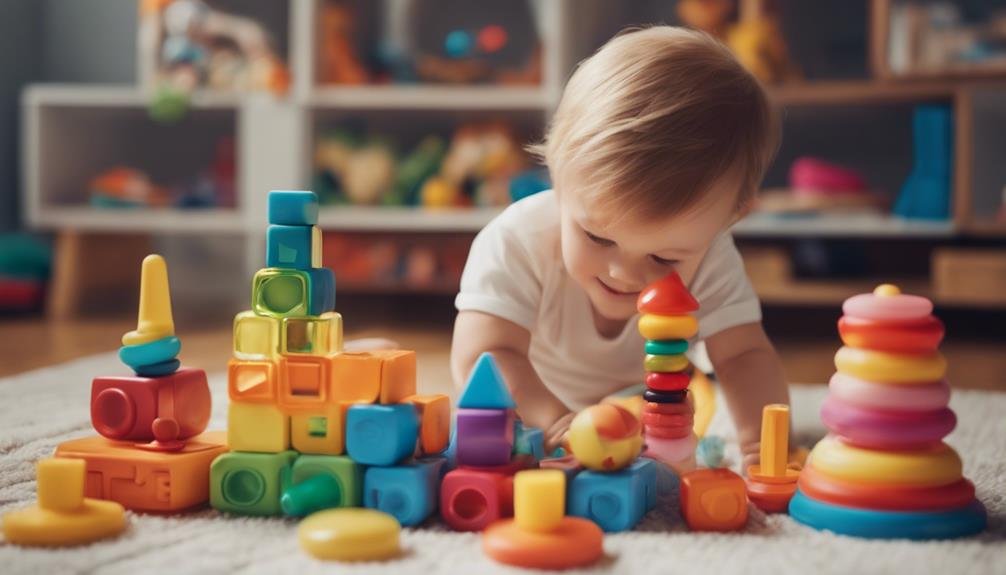
Engage your baby's cognitive development with interactive toys designed to stimulate their thinking and problem-solving skills through engaging play experiences. Toys that focus on memory improvement and logic puzzles can help enhance your baby's cognitive abilities. Memory games like matching cards or toys that require remembering sequences can be beneficial in strengthening your baby's memory skills.
Moreover, toys that promote spatial reasoning and pattern recognition are also essential for cognitive development. Activities such as stacking blocks, shape sorters, or puzzles can aid in developing your baby's spatial awareness and understanding of patterns. These toys encourage your baby to think critically, analyze shapes and sizes, and solve problems, all of which are crucial for cognitive growth. By incorporating these cognitive skills toys into your baby's playtime, you're providing them with valuable opportunities to learn and explore while having fun.
Motor Skills Development
Stimulating your baby's physical development, particularly their motor skills, is essential for their overall growth and coordination. Fine motor skills involve the use of small muscles in activities like grasping objects, while gross motor skills require larger muscle groups for movements like crawling and walking.
To enhance fine motor skills, toys like stacking rings or blocks can encourage hand-eye coordination and finger dexterity. Activities that involve picking up small objects can also help refine these skills.
For gross motor skills, toys such as push toys or soft balls can promote crawling or walking by enticing your baby to reach and move towards them. Tummy time is another excellent way to strengthen gross motor skills as it helps develop neck, back, and arm muscles necessary for crawling.
Language and Communication Toys
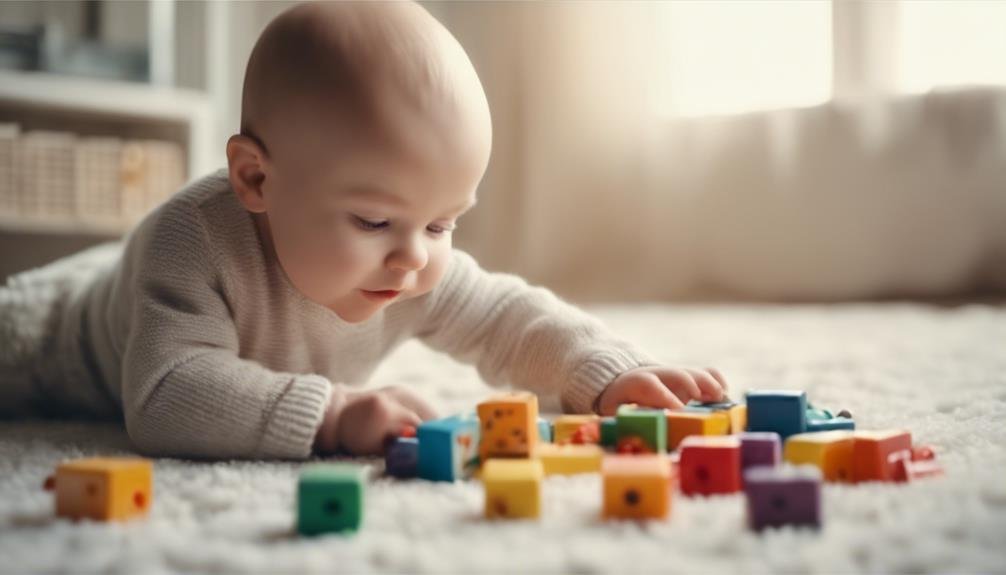
To foster your baby's language and communication skills, providing them with interactive toys that encourage verbal interaction and auditory development is important for their cognitive growth. Here are some types of toys that can aid in the development of your baby's language and communication skills:
- Vocabulary Expansion Toys: These toys are designed to introduce new words to your baby, helping them build a rich vocabulary from an early age. Look for toys that incorporate words related to everyday objects and activities to enhance language acquisition.
- Conversational Skills Toys: Toys that promote back-and-forth communication play a critical role in developing conversational skills. Interactive toys that encourage your baby to respond to prompts or questions can help them learn the give-and-take of conversations.
- Speech Development Toys: Toys that focus on sound production and pronunciation can support speech development. Look for toys that involve making different sounds or repeating words to enhance your baby's ability to articulate words clearly.
Social Interaction Toys
Social interaction toys play an important role in fostering your baby's ability to engage with others and develop essential social skills from an early age. Interactive play is critical in helping your little one understand emotions, take turns, and communicate effectively. Toys like playsets with multiple characters or interactive games encourage your baby to interact with others, teaching them about cooperation and sharing. These toys can also help develop empathy and understanding of social cues, laying a strong foundation for future relationships.
Through social interaction toys, your baby learns to express themselves, listen to others, and cooperate in a group setting. These experiences are essential for the development of social skills. By engaging in interactive play, your baby learns to navigate social situations, build friendships, and understand the importance of communication. These toys provide a safe and fun environment for your baby to practice essential social behaviors, setting the stage for healthy relationships and effective communication skills in the future.
Problem-Solving Toys
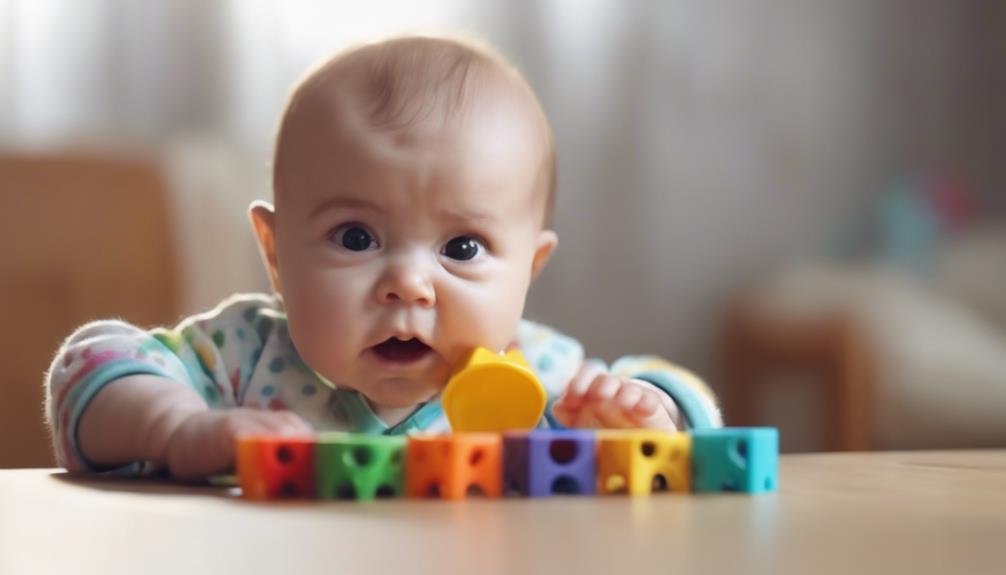
Encourage your baby's cognitive development with toys that challenge their problem-solving skills and foster critical thinking abilities. Problem-solving toys are designed to engage your little one's mind, promoting logical reasoning and analytical thinking from an early age.
Here are some types of problem-solving toys that can aid in your baby's cognitive growth:
- Shape Sorters: These toys come in various shapes and colors, encouraging your baby to match the correct shapes to the corresponding holes. By figuring out which shape fits where, your baby develops their problem-solving skills and enhances their critical thinking abilities.
- Puzzle Games: Simple puzzles with large, easy-to-grasp pieces can help your baby learn about spatial relationships and logical thinking. As they manipulate the pieces to complete the puzzle, they're engaging in critical thinking processes.
- Stacking Toys: Stacking rings or blocks require your baby to experiment with different arrangements to build a stable structure. This process promotes logical reasoning as they discover the correct sequence for stacking the pieces.
Music and Sound Toys
Engage your baby's auditory senses and enhance their cognitive development with music and sound toys that encourage exploration and sensory stimulation. Musical instruments offer a hands-on experience that can introduce your little one to different sounds and rhythms, fostering a love for music from an early age. Sound puzzles, on the other hand, provide auditory stimulation while also promoting problem-solving skills as your baby matches sounds to images. These toys not only entertain but also aid in the development of language and cognitive abilities.
To help you choose the right music and sound toys for your baby, here is a comparison table:
| Musical Instruments | Sound Puzzles |
|---|---|
| Enhance auditory skills | Promote problem-solving |
| Encourage sensory exploration | Stimulate cognitive growth |
| Develop fine motor skills | Introduce cause and effect |
| Create a love for music | Improve memory retention |
| Foster creativity | Enhance listening abilities |
Consider these aspects when selecting toys that will not only entertain but also contribute to your baby's overall development.
Best Practices for Toy Selection
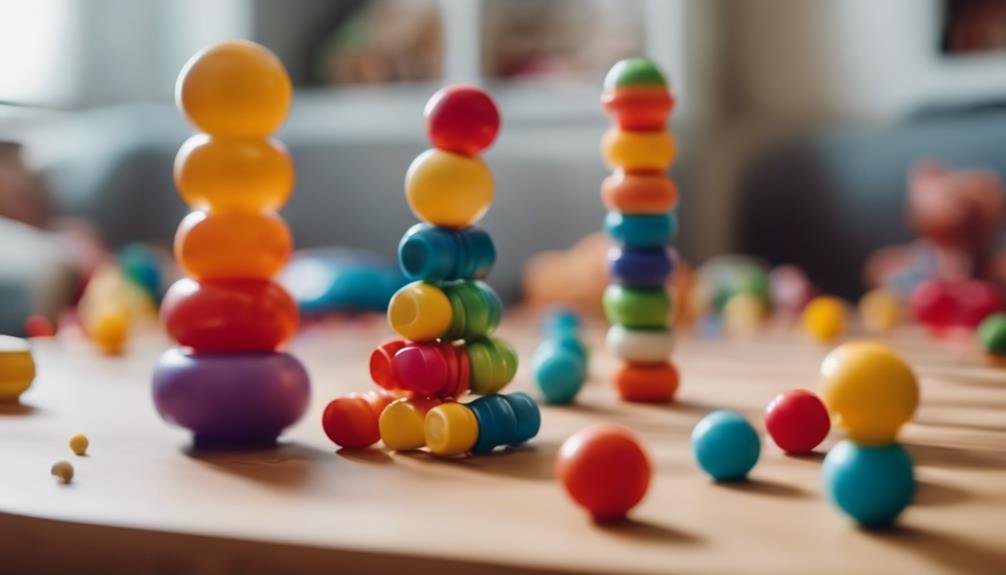
To make informed decisions when selecting toys for your baby, consider factors such as safety, age-appropriateness, and developmental benefits. Ensuring that the toys you choose align with your baby's developmental stages and playtime routines can enhance their learning experiences and overall well-being.
Here are some best practices for toy selection:
- Age Appropriate Choices: Select toys that are specifically designed for your baby's age group. Toys with small parts can be choking hazards for younger babies, so always check the recommended age range on the packaging.
- Safety Considerations: Prioritize safety by choosing toys made of non-toxic materials and free of sharp edges. Inspect toys regularly for wear and tear, and avoid toys with strings or cords that could pose strangulation risks.
- Developmental Stages and Playtime Routines: Tailor toy selection to support your baby's current developmental milestones. Rotate toys to keep playtime engaging and introduce new toys that encourage different skills like sensory exploration, fine motor skills, or problem-solving. Remember, quality playtime with appropriate toys is key to your baby's growth and enjoyment.
Frequently Asked Questions
Can Educational Toys Help Prevent or Improve Developmental Delays in Babies?
Yes, educational toys can play a crucial role in early intervention to prevent or improve developmental delays in babies. They stimulate cognitive development, foster sensory exploration, and enhance motor skills, providing a fun and effective way to support your child's growth.
Are There Any Specific Recommendations for Incorporating Educational Toys Into a Baby's Daily Routine?
To enhance your baby's cognitive development, make playtime routines rich with sensory stimulation. Engage actively with them, encouraging exploration and learning. Your involvement as a parent is key to maximizing the benefits of educational toys.
How Can Parents Know if Their Baby Is Benefiting From Playing With Educational Toys?
To know if your baby benefits from educational toys, watch for cues during play. Look for developmental milestones like improved motor skills or language development. Interactive engagement fosters learning. Remember, parental observation is key.
Are There Certain Types of Educational Toys That Are Better Suited for Different Stages of a Baby's Development?
When choosing toys for your baby, it's essential to pick ones that match their developmental stage. Age-appropriate selections enhance learning and skill-building. Incorporate these toys into your playtime routine to maximize developmental benefits for your little one.
Are There Any Potential Drawbacks to Using Educational Toys With Babies, Such as Overstimulation or Dependence on the Toys for Entertainment?
Avoid potential drawbacks by practicing toy rotation to prevent overstimulation. Limit screen time to promote healthy development. Encourage parental involvement for early intervention. Remember, moderation is key to prevent dependence on toys for entertainment.
Conclusion
As you start on the journey of choosing the best developmental toys for your baby, remember that these toys play an important role in shaping their future growth and learning.
So, make sure to select toys that stimulate their senses, engage their cognitive skills, enhance their motor skills, and foster social interaction.
With the right toys, you can create a nurturing environment that will inspire curiosity, creativity, and a lifelong love for learning in your little one.
Choose wisely, and watch them thrive!




